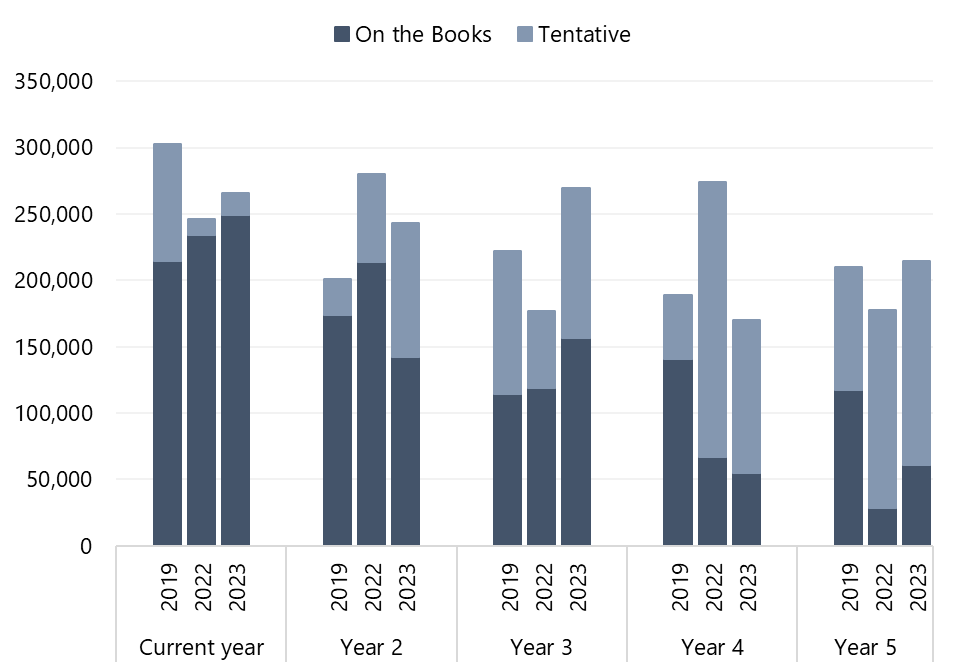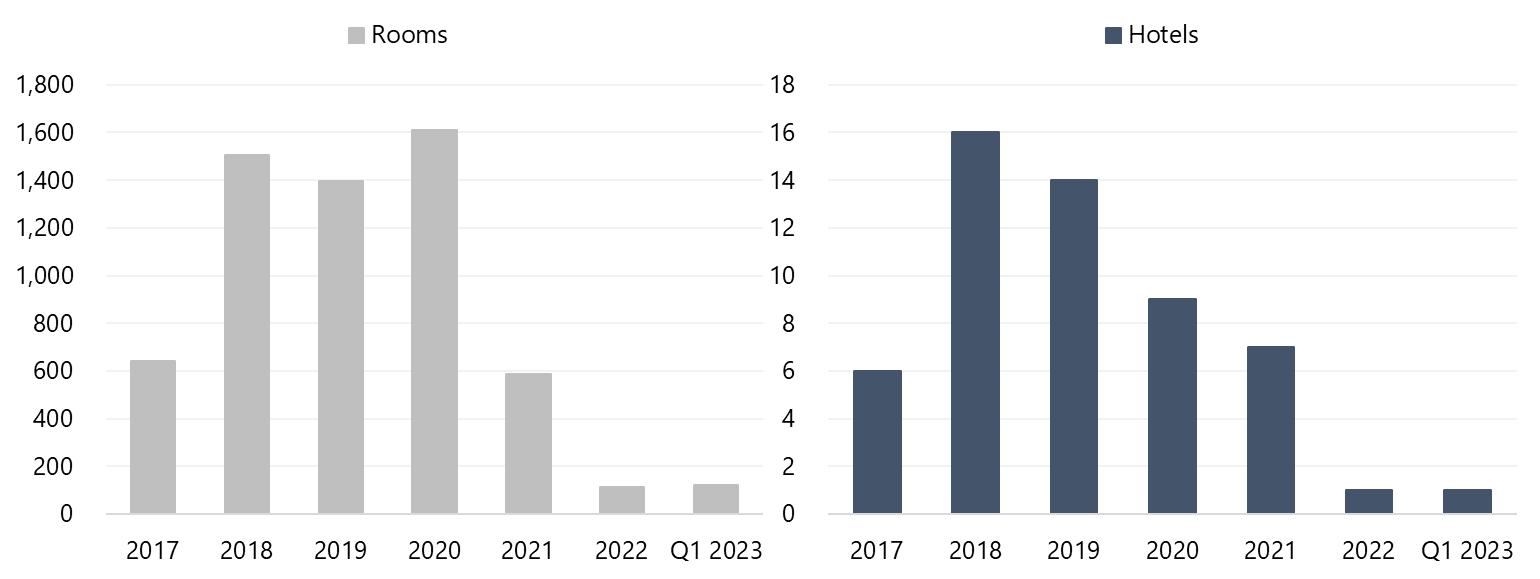The Kansas City hotel market has rebounded following the impacts of the COVID-19 pandemic, and high levels of leisure demand and the return of convention activity have driven the recovery. Despite rising construction costs, a number of hotel developments are proposed in Kansas City, signaling an optimistic outlook for the market.
Events and Developments in Kansas City
A number of major events and development projects across Kansas City should boost hotel demand and bolster pricing power in the coming years, as outlined below.- In March 2019, construction began on a $1.5-billion project to convert the Kansas City International Airport to a single-terminal facility. The new 40-gate terminal opened in February 2023, along with an adjacent 6,200-space parking garage. The old terminals will be demolished, leaving room for potential future expansion of the new facility.
- The NFL Draft took place in front of Union Station in April 2023. This is the first time that Kansas City has hosted the event, and it was expected to draw hundreds of thousands of visitors, likely the largest event in Kansas City's history.
- In 2022, Meta Platforms Inc. began construction on a one-million-square-foot data center in northern Kansas City, which will cost over $800 million and is expected to be operational in 2024.
- Hunt Midwest acquired 3,300 acres of land northeast of the airport and plans to begin construction on the KCI 29 Logistics Park in 2023. The project includes the construction of 27 Class A industrial buildings, which will total more than 20 million square feet of manufacturing and warehouse facilities.
- On the western edge of the KC metro area in De Soto, Kansas, Panasonic has broken ground on a $4-billion electric-vehicle battery plant. The project is expected to create 20,000 jobs and will begin mass production of lithium-ion batteries in March 2025.
- Kansas City will be one of the host cities for the 2026 FIFA World Cup; select matches will be played at GEHA Field at Arrowhead Stadium. City officials are estimating that the event will generate roughly $700 million in positive economic impact from visitor spending, largely benefiting the hospitality, restaurant, and entertainment industries.

Convention Center Demand Outlook
In an effort to attract large convention groups to the city, public officials sought the development of a new flagship hotel for the Kansas City Convention Center prior to the COVID-19 pandemic, and the 800-room Loews Kansas City was completed in 2020. Although the pandemic delayed the anticipated benefits of the new hotel, such as more conventions and attendees, the number of events and room nights generated by the convention center rebounded rapidly, reaching pre-pandemic levels in 2022.The outlook for activity at the convention center in 2023 is relatively strong, as the number of room nights on the books already exceeds those recorded for 2022. Furthermore, a significant number of booked and tentative room nights are in the pipeline for 2024 and beyond.

Supply Growth
The Kansas City market experienced an influx of hotel supply over the past decade, largely attributed to the revitalization of downtown and the continuing development of Johnson County, Kansas. Furthermore, developers had a strong incentive to build given the relatively cheap debt and only moderate increases in construction costs prior to the COVID-19 pandemic.However, these market conditions have changed since 2020. The pandemic dramatically slowed the hotel construction pipeline, and the subsequent increases in development and capital costs have limited the number of new hotel projects. Despite these headwinds, Kansas City continues to attract development interest due to the optimistic outlook for this market.
The following charts show the number of hotels and rooms that have opened in the Kansas City metro area since 2017.

Furthermore, the breakdown of new hotel projects we are currently tracking is illustrated below.

Historical Performance and Outlook
Occupancy was negatively affected by the introduction of new supply prior to the COVID-19 pandemic and continued to decline in 2020 as the pandemic affected the market. Since then, increases in leisure travel, the return of major events, and a high volume of construction activity have supported the recovery of hotel demand levels in Kansas City. As of year-end 2022, occupancy remained somewhat below pre-pandemic levels as new supply had not been fully absorbed by the market; however, the ongoing return of many employees to offices, an increase in group gatherings, and several scheduled major events are expected to drive enough demand to outpace new supply and push occupancy back to a normal level.Average rates for this market are anticipated to continue the strong growth trend that was realized in 2021 and 2022 through the first half of 2023 given the number of special events slated for the market. Thereafter, the pace of ADR growth is expected to moderate somewhat, particularly during 2024, which is expected to have a weaker convention calendar. However, Kansas City will host a series of World Cup matches in 2026, which should positively affect pricing power that year.
Conclusion
A strong recovery of demand since the COVID-19 pandemic, several large developments, and a number of scheduled events all contribute to an optimistic forecast of demand in the Kansas City market. Given these factors, hotel development interest in Kansas City is strong, despite rising construction costs.For detailed forecasts or to inquire about a specific hotel project, contact Benjamin Giebler or Dan McCoy of the HVS St. Louis office.